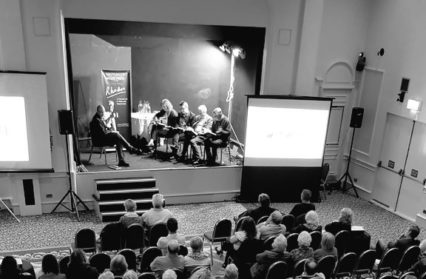Durre Shahwar and Gary Raymond report back from the second Cardiff Book Festival held at the Angel Hotel in the city centre across the weekend of September 22-24th.
Durre Shahwar
It is becoming increasingly difficult to separate the personal from the political in art. It seems nothing can be left isolated from wider global issues that effect our everyday lives, not even chick lit. Cardiff-based writer, Laura Kemp was joined by Jo Carnegie, the ex-deputy editor of Heat Magazine and the author of seven women’s fiction novels, in a discussion about romcoms and “happily-ever-afters”. To a mostly female audience, the two defended the genre of women’s fiction against cynicism and snobbery. Chick lit may well be a form of escapism, but at the same time can be a form of female empowerment, discussing taboo topics such as sex in all its forms, in debunking myths around the topic. At one point, Kemp described chick lit as a self-help manual, powerful in the way that it portrays women surviving through the strength of female friendships.
The limitations of the genre were also highlighted by the writers who argued that there is a duty of care to market the books that fall under it correctly. For example, it is likely that the covers won’t fully reflect serious issues such as mental health, domestic abuse and violence that may be contained within the narrative. In lieu of that, when asked if they had ever thought to write a negative ending, both also stated that anything other than a happy ending was out of the question. The well-focused discussion also posed a lot of other questions. For instance, despite the fact that there is a lot of men’s writing that also explores similar themes of romance and domestic life, no such limitations to ‘men’s lit’ exists for them. And no scoffing either.
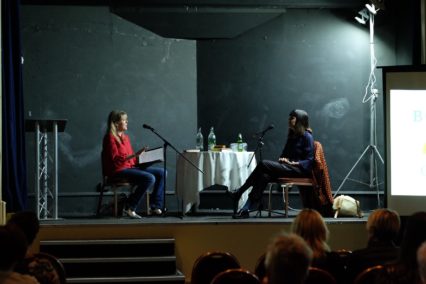
Catherine Mayer, co-founder of the Women’s Equality Part (WEP) perhaps had a better solution to offer when it came to happy endings when in conversation with Carolyn Hitt: “Feminism is the happy ending of the book.” Those familiar with the concept of glass ceilings may or may not be familiar with the concept of the ‘glass cliff’, which, according to Meyer, Theresa May is a prime example of. It is the idea that women often only come to power due to the implosion of male vanity and a crisis within a party and on a national level. Women become heads of companies only when the company seems to be failing, while men stand aside and then come riding in once it’s been saved.
Scott Lloyd’s talk on the Arthurian place names of Wales traced back the legend of King Arthur through landmarks. His new book had been a research in progress for the past decade or so. Drawing on material dating as far back as the 9th Century, the talk offered an extensive and fresh chronological timeline of a popular and heavily drawn on legend. Though it was interesting to hear that historically, King Arthur was often glossed over when it came to Welsh kings due to him being overused in English material, which almost tainted him in Welsh eyes.
The influence of Wales and its landscape in fiction is also evident in Alys Conran’s Pigeon and Rebecca F. John’s The Haunting of Henry Twist. The former remarked on how “Wales is an incredible place to be from as a writer – the richness of language – we don’t take it for granted.” It is a time when explorations of home and belonging are prevalent in literature more than ever, and the Welsh are no exception to it, as Rebecca F. John states how writing about home and the landscape of it has been an exploration of what it means to belong in it. On literary influences and inspiration, both are in agreement that good characters and voice are essential to their writing, citing Toni Morrison’s characters amongst others.
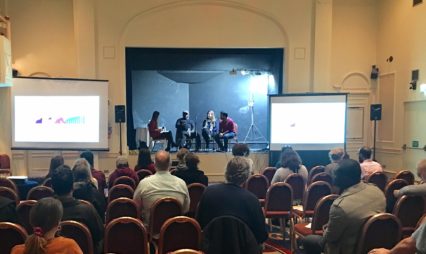
It is true that Wales has a very rich literary scene that escapes soulless commercialisation of authors and books, as pointed out by Alys Conran. Which is something that the panel of BAME Writers in Wales also agreed on while raising the issue that perhaps more needs to be done proactively to also support BAME writing in Wales. I chaired this event myself, joined by screenwriter and theatre critic, Jafar Iqbal, writer, Eric Ngalle Charles, and lecturer Dr. Dafina Paca. The panel provided an overview of what it means to be a BAME writer in Wales and barriers to access that may be faced. When talking of undoing Welsh stereotypes, Alys Conran had stated that sometimes it involved writing books that may be difficult. It felt that the BAME panel was evoking a similar difficult but necessary discussion, which raised questions rather than answered them. After all, the responsibility to ensure a broad and realistic representation of Wales’ multicultural communities in the arts that moves away from tokenism should not rest on four individuals. It is up to organisations to do the work, approach the right people and ensure more spaces are created and a platform is provided. ‘Where I’m Coming From’ an open mic promoting BAME voices in Wales, organised by myself and poet Hanan Issa is an example of one. Yet more still needs to be done systematically. Until then, the next one is on the 8th October at Tramshed Cardiff, 4pm.
There were also discussions had around the issue of identity formation and what it means to be a Welsh BAME writer, and how the two go hand in hand, yet as Jafar Iqbal pointed out, ‘You are first defined by how Welsh you are, then you are defined by gender and ethnicity’ creating various structures of minority within a minority.
Similarly, issues of representation and the censorship of voices were also strongly raised when it came to Refugee Writing in Wales, that included readings from Eric Ngalle Charles and readings in English translated from the works of Amani Bekhiet and Hannah Sabatia. It brought to light issues such as predefined power structures, and misconceptions that a facilitator must address before undergoing such work. The writers, refugees themselves, weren’t able to be present which rightly raised questions as to why, and whether enough was done to make sure they were accommodated enough and the issue of appropriation of voices. A lot is lost in translation, and to hear the poetry in the writers’ original voices would have been significantly more impactful; this way they continued to be voiceless, faceless, people who were spoken for and filtered through. It also highlighted how, in roles that seek to help refugees, to what extent do we use language that ‘others’ them also, and demeans them. However, it was good to hear the readers, Tom Cheesman and Jeni Williams say that the refugees themselves will be present at the book launch of ‘My Heart Loves in My Language’.
The more ‘industry related’ talk was given by Cathryn Summerhayes in a ‘Pitch in the Pub’ session. Which is exactly how it sounds. The event was packed with aspiring writers who had the chance to pitch their novel to Summerhayes through a Twitter competition that took place before the festival. The winners then had the chance to have a private one to one for 5 minutes with the agent herself. Summerhayes also provided a brief overview to the role of a literary agent, which is to make sure that the book idea is in the best shape possible before it is sent out into the world.
Similarly, the analysis of roles continued in ‘Is Music Crit, Critical?’ presented by Swn and chaired by one of Wales Arts Review’s senior editors, Steph Power, joined by musicians Graham Taylor and Richard J. Parfitt. The issue perhaps wasn’t whether music criticism is critical, rather whether it is critical enough, and what is the role of the music critic in current day. Social media and the Internet plays a huge role as an analytical tool that shapes how critics behave, who often may not be willing to go against popular public opinion due to instant backlash. The idea of escapism and comfort consumerism – prevalent through many panels – was again reiterated here.
It was finally agreed that without authenticity, there can be no music critique, and while various forms of music criticism may exist, the traditional form, that contained opinion, but also research and contextualisation is something that is to be yearned for.
Gary Raymond
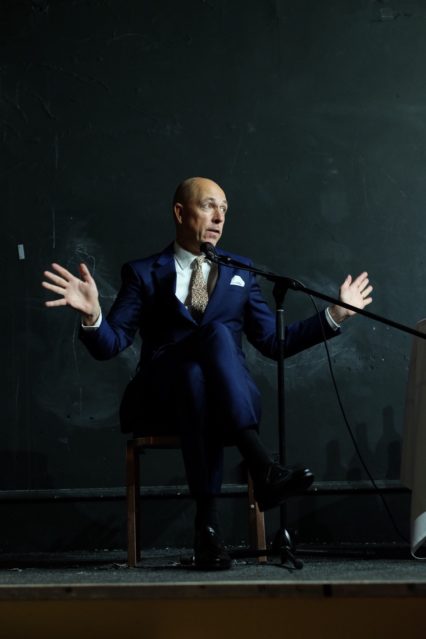
The industry of legacy was represented in two very different, much-missed figures at the festival this weekend. GQ editor (and pre-eminent British “interviewer of iconic men”) Dylan Jones revealed his Bowie superfandom with his biography of the great man garnered from years of his own interactions with him (8 0r 9 interviews and a dedication to his story). If Bowie-inspired books are now becoming little more than a mixture of shameless cash-ins and self-indulgences, Jones’ at least has a claim to being insightful as well as having the legitimacy of a journalistic approach. Jones is an engaging speaker on a subject that will never get boring when done right.
On the Saturday morning the main room was equally packed out for a tribute to Rhodri Morgan, who finished his own autobiography just a few months before he died in May of this year. It is most likely Morgan will never have as many books written about him – or “inspired by him” – as Bowie, which in some respects is both a real shame and a blessing, as the tributes paid to him here and elsewhere since his death emphasise him as the father of modern Wales. Mark Drakeford, who was very close to the former First Minister, takes the role of reading extracts, and they are warm and witty (particularly the one that focuses on Drakeford himself, his dress sense, and his general skillset). The entire session is extremely good-natured. Dafydd Elis-Thomas, former leader of Plaid Cymru even goes so far as to say Rhodri’s legacy is seen in the making of Welsh Labour (perhaps not quite the badge of honour many in the room may have interpreted it as). The book, simply titled, Rhodri, published by University of Wales Press (who are well represented at this year’s festival), is just about everything anyone with any interest in Welsh modern political life could wish for, and the fact it is so Welsh speaks quite a lot to the reasons for Rhodri’s unending popularity as a politician – there was an authentic Welsh essence to him that all people of Wales responded to.
As far as influence goes, few can claim to have got in as early and as deeply with a generation of kids as Ian Livingstone, co-founder of the GamesWorkshop and Fighting Fantasy books. To those not in the know, the FF roleplay books were a huge influence on kids growing up in the 1980s, before home games consoles. They were (and still are) an utterly immersive single-player literary experience, and it was great to hear Livingstone asked about the importance of his books (which he often co-wrote with Steve Jackson) on child literacy and particularly on children with autism and learning difficulties. He gives a funny and nostalgic half hour presentation about the 35 year history of FF, starting with the foundation of GamesWorkshop and the relationship with Gary Gygax, inventor of Dungeons & Dragons. It is a presentation, complete with old photos and insight into the publishing struggles over the decades that is begging for a Netflix documentary. Much of the success of FF, talking of publishing struggles, goes back to one persistent champion at Penguin Books, who believed in the idea and pushed through the incredulity and laughter of publishing execs to eventually produce the first book, The Warlock of Firetop Mountain, which went on to sell over 20 million copies worldwide.
The headline attraction of the festival was Robert Harris, every inch the gentleman author, here to discuss and promote his new book about Chamberlain and Hitler, Munich. Harris is excellent on all aspects of his trade; the craft, the history, the mystical allure of the life of literature, and the audience certainly get their moneys worth. He talks about the difficulty of putting Hitler into a novel, seeing as so many, on page, stage and screen, have done such an awful job of it (he singles at Bruno Ganz as one who did it right). Harris hones in on the foibles of the Führer, the things that made him real to the creator of fiction. He had trawled the most obscure memoirs – Hitler’s adjutants and valets – to find the gemstones. Hitler rarely bathed, for instance, and he had bad breath. It begs the question, is it the job of the fiction writer to bring such unknowable figures of history to life, to make them real to us, drag them out of cliché and the shadows reserved for bogeymen? There is a bit of talk between Harris and his interviewer, novelist Marcel Theroux, about Hitler’s obsession with his niece (Theroux confesses he knew nothing of this story – he had missed Ken Stott in a decent dramatisation of it a few years back for the BBC, in that case). It seems that the crux of the character of Hitler is in here, and perhaps Harris is nudging at that fact. Hitler was a syphilitic incestophile who kept a shrine to the niece who killed herself to escape him in 1932. Harris has been to the apartment they shared; he is a research junky. He has done enough also it seems to begin a resurrection of Chamberlain’s reputation. He talks of him as a tough man who was in a tricky situation, and it is only history that has damned him. Listening to Harris speak, Chamberlain becomes a formidable figure dealt with unfairly by the biased and crude hand of historical storytelling.
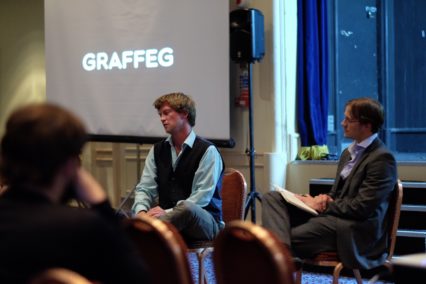
How history – or at least storytelling – treats people and events of the past is an emerging theme of the festival overall. Horatio Clare is on excellent form, just back from Madagascar for the FT – Clare was once writer in residence for a Norwegian whaling vessel, so it’s safe to assume this was not a package holiday. He talks to David Howells in a loose and meandering exploration of the myths and legends he has recently rewritten for the Welsh tourist board. This is about connecting the past to the present, summoning the universal, undying themes that attract us to stories. He bemoans the death of the British pub, where young people once used to sit and listen quietly to the wisdom and experience (and bullshit) of their elders. Myths, he says, are what we make of them. In his new book we see avatars of Trump in the murderous medieval politicking of the Welsh marches, and much more besides. “I don’t know any more about these myths than anyone else,” he says, but he does have the searing talent of a writer with a certain type of intellectual gift. There is something of the Bruce Chatwin about him (and I mean that as an enormous admirer of Chatwin the mystic, the truth-twister, rather than Chatwin the charlatan).
James Ball’s book is about bullshit – something Chamberlain and Chatwin had to deal with in relation to their own reputations. Ball is a Pulitzer-prize-winning journalist, and extremely unassuming for it, in dowdy t-shirt and scruffy trainers. He was once Julian Assange’s PR man, and he jokes how the wikileaks founder’s reputation has taken a bit of a dive since he left the job. But it also means he has a uniquely expert take on the phenomenon of bullshitting. And Ball is careful to draw a line between bullshit and lies. The liar is constructing a different reality to the truth, carefully constructing a conflicting narrative. The bullshitter couldn’t give a damn about what is true and what isn’t, they just speak whatever they feel they need to be true at any given moment in order to advance their own position. Ball talks three figures into a triumvirate of bullshit – Trump, Boris Johnson and Assange – and his arguments are damning and irrefutable. This is hardly ground-breaking, but it is interesting, and when he says that Assange is a man who says whatever he deems to be true at the moment he is saying it, there is a palpable feeling in the room of suspicions being confirmed.
In only its second year, Cardiff Book Festival has announced itself on the circuit not only with a programme that offers a wide range of voices and ideas, as well as top-drawer names, but also one that now feels like a festival, and can and will be discussed as a festival. The test now is to live up to this year on year, and to give Wales’ capital a book festival of world-renown.


